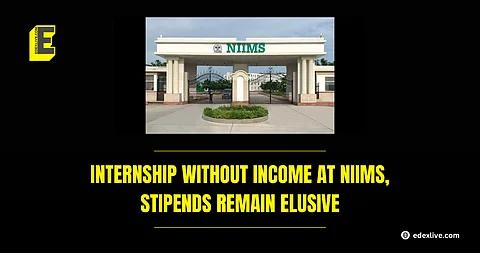

On April 1, 2025, the 2020 batch of MBBS graduates at Noida International Institute of Medical Sciences (NIIMS) began their mandatory Compulsory Rotating Medical Internship (CRMI), a final rite of passage before full medical licensure. Alongside clinical duties and long hours, they were promised stipends, as mandated by the National Medical Commission (NMC).
But over two months later, that promise remains unfulfilled. Not a single rupee has reached the interns.
More troubling than the delay itself is the chilling void that surrounds it: no official notice, no explanation from the college, and no meaningful response from state or national regulators.
The issue at NIIMS is not isolated. A recent Right to Information (RTI) revealed that nearly 60 medical colleges across India are failing to pay any stipend to their interns, while another 50 offer meagre amounts under Rs 5,000 a month.
In April 2024, the NMC issued a public directive mandating that all medical institutions pay monthly stipends to both Indian and Foreign Medical Graduates (FMGs) and publish this data openly. Nearly 200 colleges have since been served show-cause notices, but enforcement has been handed off to state authorities, leading to a dangerous accountability vacuum.
It was against this backdrop that Dr Bhanu Kumar, National Social Media Secretary of United Doctors’ Front (UDF), decided to intervene. Interns at NIIMS reached out to him on social media, seeking help after weeks of silence and institutional intimidation.
Speaking to Edexlive, he said, “The students are exhausted. They’ve been harassed when they asked questions and ignored when they followed the rules.”
His subsequent email to regulatory bodies on June 11, received the same treatment as student complaints: absolute silence. The pattern reveals an uncomfortable truth about medical education in India, where institutional accountability appears increasingly optional.
For the affected interns, the silence is more than bureaucratic, it’s a personal betrayal. One anonymous intern describes the toll of transitioning from medical student to professional while facing institutional indifference.
After four and a half years of education, these young doctors expected an internship to provide both practical experience and modest financial independence. Instead, they find themselves dependent on family support while working full-time in hospital rotations.
“We’ve approached the chairman, the HR, and even sent emails to the authorities,” says the intern. “Every time, we’re given a different excuse. Sometimes it’s 8 days, sometimes a month. No one gives a straight answer.”
More concerning is the atmosphere of fear reported on campus. Interns claim that those who speak up are tracked, intimidated, and warned of potential consequences. Management allegedly collects the names and personal details of complainants, discouraging any collective or legal action, despite clear regulatory violations.
Student representative bodies offer no relief. At NIIMS, there are no student unions to which students can turn; existing bodies are staff-controlled and ceremonial at best.
Dr Bhanu describes the situation as a microcosm of a larger failure. NIIMS charges Rs 11 lakh annually in tuition and Rs 4 lakh in hostel fees, yet, despite paying postgraduate residents and other staff on time, the college has failed to release even a basic stipend to its interns. “This isn’t a funding issue,” he said. “It’s systemic apathy, enabled by weak oversight and a lack of consequences for non-compliance.”
The institution operates under the Ayushman Bharat public-private partnership (PPP) model and is subject to both MSME Regulations and NMC mandates; however, accountability remains elusive.
The psychological cost is mounting. Students from economically weaker backgrounds, especially from marginalised communities, are the worst affected. “It’s not just about the money,” the intern said. “It’s about respect. It’s about dignity.”
While they recognise the possibility of legal action, most shy away, fearing reprisal.
As Dr Bhanu sees it, the matter has moved beyond financial redress. “This is no longer just about unpaid stipends. It’s about whether a young doctor in India can expect dignity, protection, and justice during one of the most formative years of their professional life.” So far, the answer remains worryingly unclear.
The students at NIIMS, like hundreds of others nationwide, deserve better than institutional neglect disguised as an administrative process. Their voices, amplified through social media and advocacy, challenge a system that has grown comfortable with exploitation. Whether authorities will respond remains to be seen, but the cost of continued silence grows heavier with each passing day.
